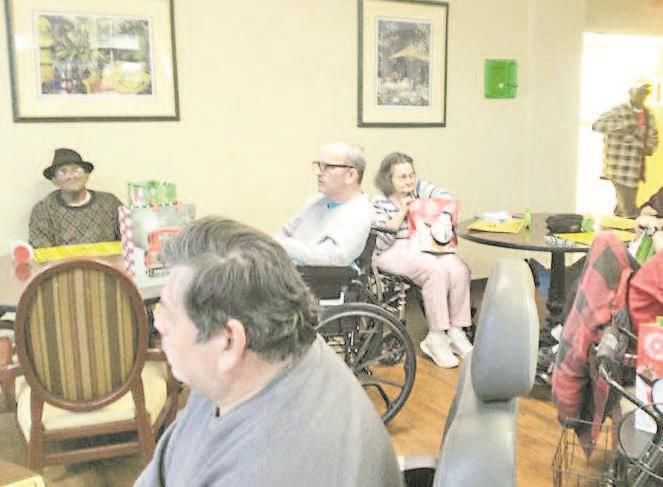
Middle school student threatened to “rape and kill”
September 30, 2016
Gernice Bourg
October 4, 2016Sweeping rules designed to enhance care and better enforce the rights of nursing home residents nationwide were announced by federal officials last week, including a ban on the practice of having residents sign away their right to sue a nursing home as a condition of admission.
Arbitration – bringing disputes to a specially trained lawyer rather than court – is preferred by many nursing homes and generally allows no avenue for appeal. Pre-admission agreement to rely on arbitration if a problem occurs has long been criticized by elder advocates as equivalent to extortion.
The new rules have been put in place by the U.S. Centers for Medicare & Medicaid Services.
“I think it is a wonderful thing if families will be able to take their cases to court,” said Terrebonne Council on Aging Director Diana Edmonson, who routinely intervenes on behalf of families with nursing home complaints. “I do know there is abuse, and we always tell families to go to the ombudsman who can bring their case to the Department of Health and Hospitals.
But many times there has been no result from that type of thing.”
The types of problems Edmonson discussed are well-documented in Louisiana, where a 2014 report by the state’s Legislative Auditor addressed major shortcomings in nursing home operations related to abuse, mistreatment and neglect. Industry representatives say much has been done since that report, causing Louisiana’s nursing home rankings to move from 49th or 50th in the nation to 40th.
A U.S. Department of Justice investigation concerning nursing homes in Louisiana is on-going, an official with that agency confirmed on Friday, though few details were provided. The official, speaking strictly on background, said the probe is being done by the Civil Rights Division in connection with the Americans with Disabilities Act. It concerns “Louisiana’s use of nursing facilities to provide services to persons with disabilities.”
There is speculation within the industry that the investigation may relate to increased placement in nursing homes of psychiatric patients, and the standards of care they receive, including the potential that some are being over-medicated to increase thresholds of compliance and cooperation.
HOOPS TO JUMP
Regardless of the issues confronting specific patients – or how well Louisiana nursing homes are progressing in addressing shortcomings overall – advocates say the state has erected major hurdles to accountability in its laws. The new rule concerning ability to sue, they note, makes little difference in a state that uses screening panels before such suits get near courtrooms. And even if they do, Louisiana’s strict caps on medically-related awards from juries or judges erode the potential of accountability.
“Because you have to go to medical review panels before you can file suit and a bunch of other hoops you have to jump through, unfortunately for the elderly in Louisiana and their families there is little redress,” said Stephen Herman, a New Orleans attorney familiar with medical suits. He and other experts note that Louisiana’s laws are so nursing home-friendly that most institutions in the state haven’t bothered with mandatory arbitration.
Other new rules that are part of the package will likely have a more direct effect on the care residents of local nursing homes and those throughout Louisiana receive. They include new staffing level standards designed to better reflect the health needs of residents in a particular nursing home, more expansive after-care planning and upgrades of infection prevention and control programs.
Advocates say the rules are only as good as their enforcement, and some question how thoroughly federal authorities will keep the pressure on nursing homes to comply.
“Medicare may set standards but there are no real teeth for compliance,” said Ron Lospennato, co-director of legal services at The Advocacy Center, a New Orleans-based organization that assists nursing home residents and their families. “There is no real ability to force requirements so when nursing homes don’t achieve things like patient-doctor rations they just get away with it.”
LACK OF BALANCE
A key problem in Louisiana – besides barriers to lawsuits – is the state’s approach to long-term care, according to Lospennato and other advocates.
Most states, the Louisiana advocates argue, have taken steps to better balance what they spend on home-based services versus their allowances for nursing homes and other institutions, making more money available for home and community-based care.
“Louisiana, on the other hand, seems to be trending toward proportionately less spending on home and community-based services, rather than more,” a letter signed by the Advocacy Center and other groups sent to state officials in 2015 reads. “In 2012, Louisiana spent approximately 30 percent of the long-term services and supports expenditures on home and community-based services; in 2015, the expectation is that Louisiana will spend approximately 27 percent of the long-term supports and services expenditures on home and community-based services. Although this decline is not huge, the expected average expenditure on home and community based services in other south central states – Alabama, Arkansas, Kentucky, Mississippi, Oklahoma, Tennessee, and Texas – is projected to be a little over fifty percent in 2015.”
About 35,000 people in Louisiana are awaiting waivers that will allow them community-based or home care, Lospennato said, noting, as did the letter, that the cost differential is significant.
Louisiana, he said, is poised to spend $209 per capita on nursing homes and other institutions and $80 per capita on home care and community based services. Other states cited are projected to spend $146 per capita on nursing homes and $138 on community care.
Considering the current conditions, advocates say families need to carefully examine nursing home choices.
In Terrebonne and Lafourche those choices, according to federal reports detailing complaints and violations, offer more positive potential than in some other places. But the results still vary widely.
According to Medicare records, Raceland Manor in Lafourche Parish had “much below average” scores in three key categories: health inspection, staffing and quality measures. In Houma, Maison De’Ville had “much below average” scores in two of those, health inspection and quality measures.
Both Maison DeVille and Raceland Manor scored “much below average” overall.
Repeated calls to administrators at both institutions were not returned.
DEFICIENCIES NOTED
Among the Raceland Manor deficiencies, according to the most recent health and safety report, was failure to ensure that “residents were not exposed to live bees in their bathroom.”
Failure to keep bathrooms clear of ants was also cited, and at least two bee stings were reported.
A problem with insects resulted in a serious problem at one Louisiana nursing home which, though not in the Houma or Thibodaux area, recently received significant attention.
A resident of the Heritage Manor Nursing Home in Ville Platte last month, an 84-year-old woman, suffered more than 1,000 ant bites, according to a report filed with that town’s police department. The ants were believed to have entered the woman’s room through her air conditioning vent.
Less sensational – though certainly troubling – are complaints at Chateau Terrebonne of falsified logs related to required checks of an incontinent patient. At the same institution a complaint was substantiated regarding failure of staff to answer call buttons, resulting in patients who were unable to receive assistance getting to a bathroom and therefore wet their beds.
“(The resident) indicated he didn’t mind peeing on himself or waiting a while because a resident fell or they are tending to someone who needs to go to the hospital,” one report reads. “But not if they are just standing there talking because that’s just not right.”
“DAMNED IF YOU DON’T …”
Nursing home administrators and their supporters acknowledge that more can be done – and is being done – to make nursing home safer and more comfortable for patients. Doing so, they say, is a major priority.
But they also say their business is riddled with pre-existing conflicts.
Desires and in some cases mandates for minimal restraint practices conflict with the need to keep patients safe, especially those whose unchecked mobility may result in injury or worse. Easing up on sedation of some patients could result in risk to other patients.
“Every day is a damned if you don’t, damned if you do challenge on nursing facilities with so many of these issues,” said Joseph Donchess, executive director of the Louisiana Nursing Home Association. “A family member may ask why isn’t the rail up on my mom’s bed, and we explain that if we use it we are violating freedom of movement. They say they don’t want her falling and put the rail up. Those are the battles we fight every day. So we will put a mat on the floor.”
Caregivers are keenly aware of fine lines, Donchess said, noting how some patients can have extremely brittle bones so a fall of a short distance can result in a knee or leg break, and the beginning of deterioration.
Louisiana’s dismal standing among the states. Donchess said, can in part be attributable to how federal agencies keep their records. A few incidents of a problem in one nursing home, he notes, can result in a label for multiple states in the Medicare region of which Louisiana is a part The same equation for determining ratings, Donchess said, is not applied in other U.S. Medicare regions.
Medication requirements are often imposed by doctors who don’t work for the nursing home. There are protocols through which staff, who are doing hands-on work with patients every day, can make recommendations. But problems, Donchess acknowledges, still exist.
LNHA, Donchess said, encourages families to ask questions when deciding on care for a loved one. At the organization’s website, lnha.org, families can access a lengthy checklist that families can use in making their choices.
Residents at the Maison DeVille nursing home in Houma, from its Facebook page. Louisiana nursing homes score traditionally low marks compared to those in other states, but have been cleaning up their act.
Seniors and other nursing home residents received greater protections recently from new Medicare and Medicaid regulations.











